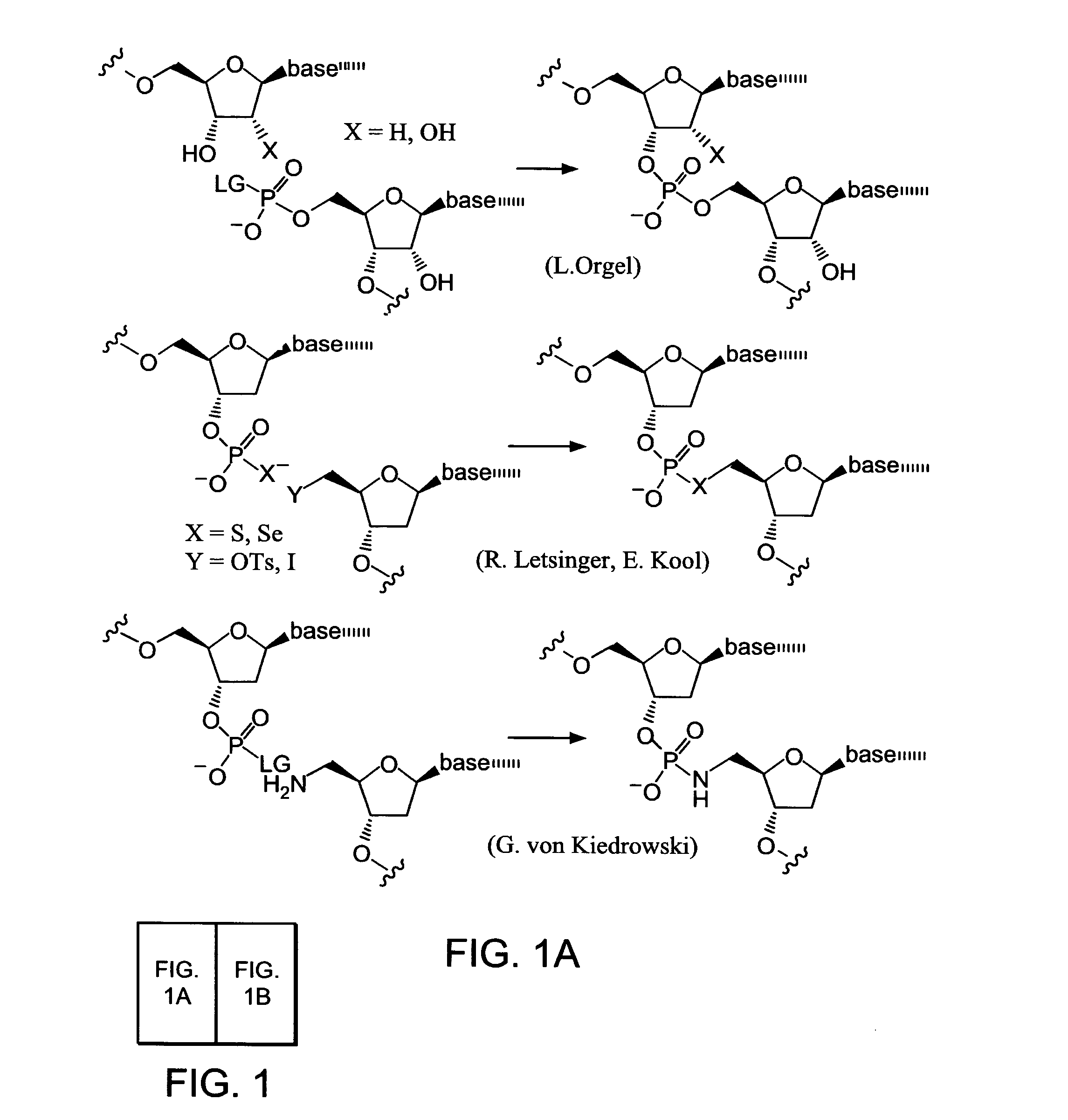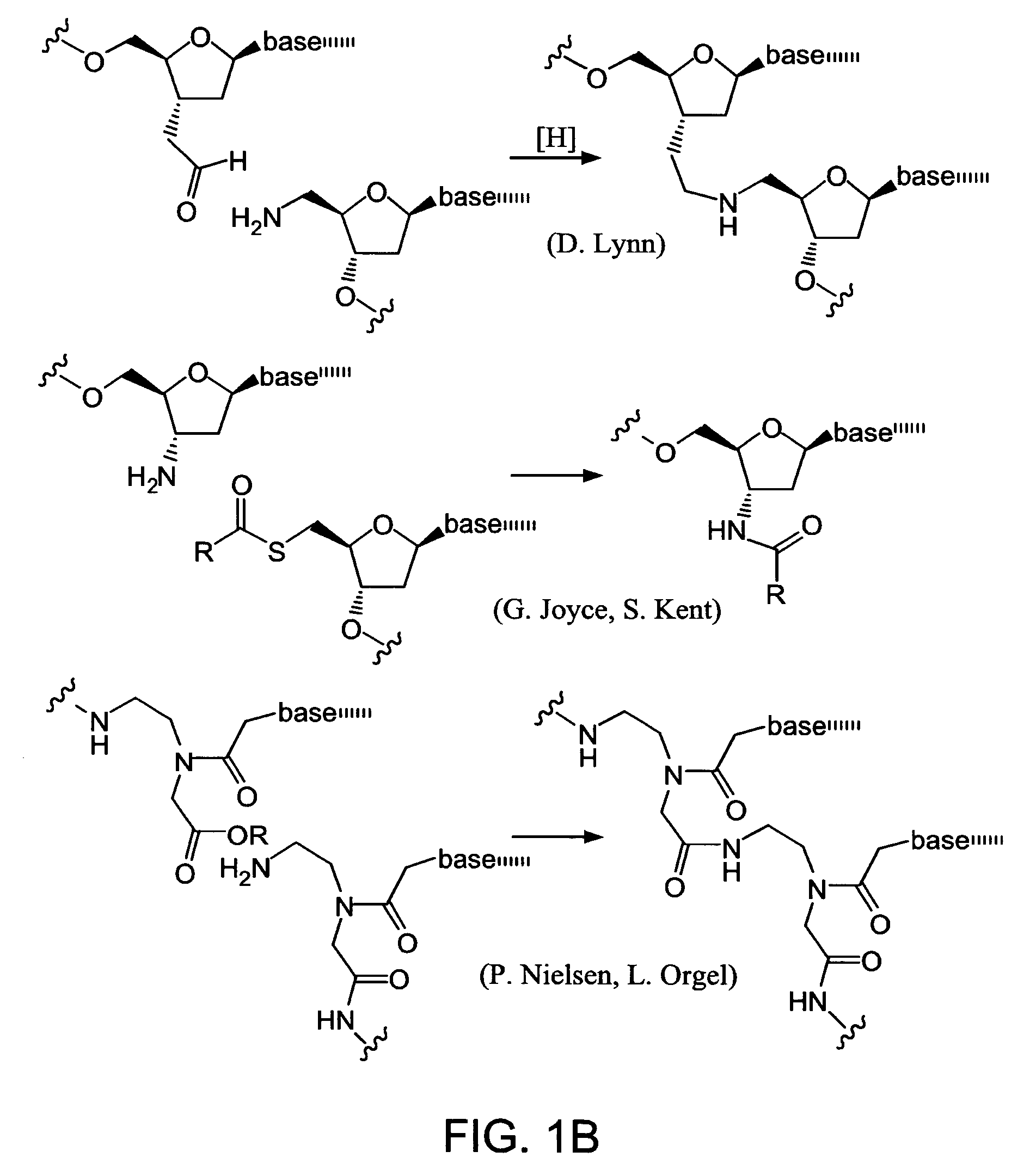Evolving new molecular function
- Summary
- Abstract
- Description
- Claims
- Application Information
AI Technical Summary
Benefits of technology
Problems solved by technology
Method used
Image
Examples
example 1
The Generality of DNA-Templated Synthesis
[0316]Nucleic acid-templated synthesis is extremely versatile and permits the synthesis of a variety of chemical compounds. This Example demonstrates that it is possible to perform DNA-templated synthesis using two different DNA template architectures.
[0317]As shown in FIG. 15, templates with a hairpin (H) or end-of-helix (E) architecture bearing electrophilic maleimide groups were prepared to test their reactivity with a transfer unit comprising, a complementary DNA oligonucleotide associated with a thiol reagent. Both the H and E templates reacted efficiently with one equivalent of the DNA-linked thiol reagent to yield the thioether product in minutes at 25° C. DNA-templated reaction rates (kapp=˜105 M−1s−1) were similar for H and E architectures despite significant differences in the relative orientation of their reactive groups. In contrast, no product was observed when using reagents containing sequence mismatches, or when using template...
example 2
Exemplary Reactions for Use in DNA-Templated Synthesis
[0334]This Example demonstrates that DNA-templated synthesis can direct a modest collection of chemical reactions without requiring the precise alignment of reactive groups into DNA-like conformations. Furthermore, this Example also demonstrates that it is possible to simultaneously translate in one-pot a library of more than 1,000 templates into the corresponding thioether products, one of which could be enriched by in vitro selection for binding to streptavidin and amplification by PCR.
[0335]As described in detail herein, a variety of chemical reactions for example. DNA-templated organometallic couplings and carbon-carbon bond forming reactions other than pyrimidine photodimerization can be utilized to construct small molecules. These reactions represent an important step towards the in vitro evolution of non-natural synthetic molecules by permitting the DNA-templated construction of a diverse set of structures.
[0336]The abilit...
example 3
Multi-Step Small Molecule Synthesis Programmed by DNA Templates
[0351]This Example demonstrates that it is possible to perform multi-step small molecule synthesis via DNA-templated chemistries.
[0352]DNA-templated synthesis can direct a wide variety of powerful chemical reactions with high sequence-specificity and without requiring structural mimicry of the DNA backbone. The application of this approach to synthetic molecules of useful complexity, however, requires the development of general methods to permit the product of a DNA-templated reaction to undergo subsequent DNA-templated transformations.
[0353]Multi-step DNA-templated small molecule synthesis faces two major challenges beyond those associated with DNA-templated synthesis in general. First, the DNA used to direct reagents to appropriate templates must be removed from the product of a DNA-templated reaction prior to subsequent DNA-templated synthetic steps in order to prevent undesired hybridization to the template. Second, ...
PUM
 Login to View More
Login to View More Abstract
Description
Claims
Application Information
 Login to View More
Login to View More - R&D
- Intellectual Property
- Life Sciences
- Materials
- Tech Scout
- Unparalleled Data Quality
- Higher Quality Content
- 60% Fewer Hallucinations
Browse by: Latest US Patents, China's latest patents, Technical Efficacy Thesaurus, Application Domain, Technology Topic, Popular Technical Reports.
© 2025 PatSnap. All rights reserved.Legal|Privacy policy|Modern Slavery Act Transparency Statement|Sitemap|About US| Contact US: help@patsnap.com



